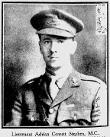Adrian Consett Stephen was the second son of Alfred Stephen, solicitor, and his wife, Kate nee Suttor, who were married at Bathurst in 1887. He was educated at the Sydney Grammar School and St. Paul's College in the University of Sydney. During his undergraduate years he was a leading member of the Undergraduates' Association, the Union Board and the Law Society as well as editor of The Pauline and Hermes. Stephen was also secretary and leading actor in the Sydney University Dramatic Society. Four plays were written at this time by him and one of his professors, Mungo MacCallum, wrote: 'None of the students I ever had in forty year's experience had such an instinct for high social comedy as he, and his humour and satire were always playful and kindly.' (Holme, x). He graduated B.A. (1913) and LL.B. (1915).
In March 1915 Stephen sailed privately to England, 'enlisted as a lieutenant of the Royal Field Artillery, was promoted to acting-major of his battery and gained the Military Cross for gallantry at Passchendale.' Stephen was killed when a shell penetrated into some deep tunnels in the Ypres Salient on 14 March 1918. Lieutenant Colonel Cochcraft wrote that 'I have lost one of my most gallant and efficient officers.' The Adrian Consett Stephen Memorial Prize was established by his aunt in 1918. Professor E. R. Holme summed up his life in these words: 'The soul of Adrian Stephen was filled with passionate desire for dramatic creation; in that he must have reached his life's crown...The civilian became a great soldier by one of those acts of renunciation which are higher than the happiness of realization.' (Holme, x).
(Source: Book of Remembrance of the University of Sydney in the Great War, 1914-1918 (1939): 476; E. R. Holme, 'Foreword' in Adrian Consett Stephen Four Plays (1918); A. Consett Stephen, 'Preface' in Adrian Consett Stephen An Australian in the R.F.A. (1918): xiii-xviii).
 5964582249586117071.jpg
5964582249586117071.jpg